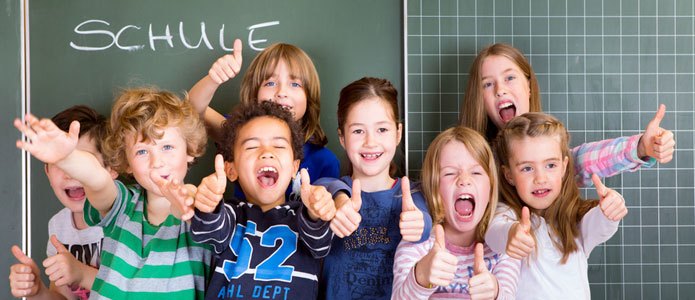They upend conventional education concepts. Laboratory schools, Free Alternative Schools and other innovative approaches ensure that students in German schools enjoy more freedom. They would also appear to offer great potential for integrating students with a migration background.
A school with no bell for break time – anyone who has ever waited longingly for the signal marking the end of the lesson will find this idea irritating. For decades now, teachers and students at Bielefeld Laboratory School have managed quite well without the bell: they know themselves when they need a break.
In the 1970s, the University of Bielefeld set up two experimental schools that were designed to upend conventional teaching concepts: the laboratory school (LS), which admits school starters and offers instruction up to year ten; and the Oberstufen-Kolleg (sixth form college), which prepares students in the gymnasiale Oberstufe (the equivalent of sixth form or senior high school) for the German university entrance examination. Even now, the schools founded by educational reformer Hartmut von Hentig see themselves as generators of ideas for the educational system. In the first three years, five- to seven-year-olds learn together in mixed-age courses, and up to year eight laboratory schools dispense with subject teaching. Working self-reliantly and learning through experience in projects are also key features of teaching at the Oberstufen-Kolleg. Neither of the two schools has classrooms: the learning groups share open-plan spaces the size of gymnasiums with lowered and raised areas. The open learning environments are structured by work tables, groups of seats and wall units, which also enable smaller groups to work together.
Many of the innovations tried out in Bielefeld – like open learning, project work or teaching English to primary school students – have long become standard in mainstream schools, too. Over the years, generations of trainee teachers whose first experience of school was at one of the two Bielefeld institutions have introduced new approaches in everyday practice at their schools. In research and development projects, teachers and researchers are supporting the work at the experimental schools and developing new concepts.
The traditional role of the teacher is a thing of the past
Working in multi-professional teams, for example, in which teachers and psychologists collaborate with special-needs and social educators, is something that has been tested in practice for many years in Bielefeld. “It’s still a blueprint,” explains educational researcher Peter Drewek. “But it’s going to be introduced at mainstream schools as well because the traditional role of the teacher is changing.” Classes are becoming more heterogeneous, with students coming from different backgrounds and having different levels of ability.
Self-determined learning, democratic co-determination and mutual respect are among the fundamental principles observed at the approximately 100 schools that are members of the National Association of Free Alternative Schools (BFAS). “At all schools, there are intense debates about how much students should decide for themselves and where they need a structured learning environment,” observes BFAS managing director Tilmann Kern. “Some allow students to decide freely about the whole of their school day, others have compulsory core areas.” BFAS represents a wide variety of school models. Many of them, like the Freie Schule Frankfurt or the Glockseeschule in Hanover, were created in the early 1970s as a result of parent initiatives. Even today, most of the parents are from educated middle-class, creative backgrounds. What they all have in common is an educational approach that promotes children’s community spirit and self-reliance. But not all students cope equally well with a high degree of freedom, emphasises Tilmann Kern.
Everyone learns from everyone else
Since the “Pisa shock”, alternative school forms have been experiencing a renaissance in Germany. The nationwide education study had given German schools surprisingly bad marks. By contrast, innovative education concepts like Bielefeld Laboratory School received above-average scores. The idea of Jenaplan schools is also increasingly gaining currency in Germany. In the 1920s, educationalist Peter Petersen developed his ideas about a “school of self-affirmation”, which he put into practice at an experimental school in Jena. In home groups, each comprising students from three different years, everyone learns from everyone else. The aim is to give all students time to develop their skills. Besides the Jenaplan schools in Germany, the Netherlands and Belgium, there are teachers all over the world who follow Peter Petersen’s educational ideas. The exciting thing is: given the current challenges facing education policy, the reform-educational model offers potential for teaching students with a migration background and for teaching German as a second language. The results of a study conducted in Berlin-Neukölln, at one of the few Jenaplan schools in Germany with a high proportion of migrant students, show that for language-skill promotion, intercultural teaching and integration measures to succeed in the case of students with a migration background one thing is particularly important: helping children to develop as whole human beings, not just as students.
